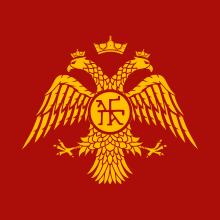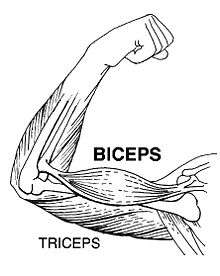Definify.com
Webster 1913 Edition
Biceps
‖
Bi′ceps
,Noun.
(Anat.)
A muscle having two heads or origins; – applied particularly to a flexor in the arm, and to another in the thigh.
Definition 2025
biceps
biceps
See also: bíceps
English

Biceps brachii; the biceps of the arm.
Noun
biceps (plural biceps or bicepses)
- (anatomy) Any muscle having two heads.
- 1901, Michael Foster & Lewis E. Shore, Physiology for Beginners, page 73
- The leg is bent by the action of the flexor muscles situated on the back of the thigh, the chief of these being called the biceps of the leg.
- 1901, Michael Foster & Lewis E. Shore, Physiology for Beginners, page 73
- Specifically, the biceps brachii, the flexor of the elbow.
- 1996, Robert Kennedy & Dwayne Hines II, Animal Arms, page 21
- The arm muscles are the show muscles of the physique. When someone asks to "see your muscles," they are most likely referring to your arms, and more specifically, your biceps.
- 1996, Robert Kennedy & Dwayne Hines II, Animal Arms, page 21
- (informal) The upper arm, especially the collective muscles of the upper arm.
- 1964 Dec, “Muscles are His Business”, in Ebony, volume 20, number 2, page 147:
- Today, Stonewall's flexed biceps measure 18 inches around.
- 2005, Lisa Plumley, Once Upon a Christmas, page 144
- Biting her lip, she held his biceps for balance and waded farther.
-
- (prosody) A point in a metrical pattern that can be filled either with one long syllable (a longum) or two short syllables (two brevia)
- 1987, Martin Litchfield West, Introduction to Greek Metre
- Also it is advisable to distinguish this ( ˘ ˘ ) — ˘ ˘ — rhythm, where the princeps was probably shorter in duration than the biceps (as in the dactylic hexameter), from true (marching) anapaests, in which they were equal.
- 2000, James I. Porter, Nietzsche and the Philology of the Future, page 347
- This means that in the metrical sequence […] recited in ordinary speech rhythm, the princeps occupied a slightly shorter time than the biceps (5:6), and if a long syllable was used to fill the biceps it had to be dragged a little […]
- 1987, Martin Litchfield West, Introduction to Greek Metre
Usage notes
- Now often mistaken as a plural form; see bicep. An archaic plural bicipites, borrowed from the Latin, also exists.
Synonyms
- (the biceps brachii): biceps brachii, biceps cubiti
- (the upper arm): guns, pythons, upper arm
Antonyms
- (prosody): princeps
Derived terms
- bicep
- biceps curl
Related terms
|
Translations
any muscle having two heads
|
|
biceps brachii — see biceps brachii
the upper arm, especially the muscles
(prosody) point in a metrical poem
Dutch
Etymology
From Latin biceps (“two-headed”).
Pronunciation
- IPA(key): /ˈbi.sɛps/
- Hyphenation: bi‧ceps
Noun
biceps m (plural bicepsen, diminutive bicepsje n)
- (anatomy) biceps; any two-headed muscle
- the biceps brachii
- 2007, C. A. Bastiaanssen, Anatomie en Fysiologie, page 387
- De biceps en de triceps zijn elkaars antagonisten.
- The biceps and the triceps are each other's antagonist.
- De biceps en de triceps zijn elkaars antagonisten.
- 2007, C. A. Bastiaanssen, Anatomie en Fysiologie, page 387
Synonyms
- (biceps brachii): armbuigspier, elleboogbuiger, spierbal
See also
- tweekoppige
French
Etymology
From Latin biceps (“double-headed”).
Pronunciation
- IPA(key): /bi.sɛps/
Noun
biceps m (plural biceps)
- (anatomy) biceps (any two-headed muscle)
- the biceps brachii
- 1978, Freddy Buache, Cinéma Anglais, page 154
- Mais Bronson se définit uniquement par son physique (biceps, démarche souple) et non par la densité de sa présence ce qui limite ses possibilités d'emploi.
- But Bronson is defined only by his physique (biceps, supple gait) and not by the density of his presence which limits his employment possibilities.
- Mais Bronson se définit uniquement par son physique (biceps, démarche souple) et non par la densité de sa présence ce qui limite ses possibilités d'emploi.
- 1978, Freddy Buache, Cinéma Anglais, page 154
Derived terms
- avoir du biceps
- biceps brachial
- biceps crural
- biceps fémoral
Latin

aquila biceps (double-headed eagle)
Alternative forms
- bicapitēs
- bicipēs
Etymology
From bis (“twice”) + -ceps (“headed”).
Pronunciation
- (Classical) IPA(key): /ˈbi.keps/
- (Ecclesiastical) IPA(key): /ˈbi.tʃɛps/
Adjective
biceps m, f, n (genitive bicipitis); third declension
- double-headed, having two heads
- (of mountains) having two summits or peaks
- 8 CE, Ovid, Metamorphoses 2.221
-
ardet in inmensum geminatis ignibus Aetne
Parnasosque biceps et Eryx et Cynthus et Othrys- Aetna blazes in immense doubled flames
and twin-peaked Parnasus and Eryx, Cynthus and Othrys
- Aetna blazes in immense doubled flames
-
ardet in inmensum geminatis ignibus Aetne
-
- (of swords) double-edged
- (by extension) divided into two parts
Inflection
Third declension.
| Number | Singular | Plural | |||
|---|---|---|---|---|---|
| Case / Gender | Masc./Fem. | Neuter | Masc./Fem. | Neuter | |
| nominative | biceps | bicipitēs | bicipitia | ||
| genitive | bicipitis | bicipitium | |||
| dative | bicipitī | bicipitibus | |||
| accusative | bicipitem | biceps | bicipitēs | bicipitia | |
| ablative | bicipitī | bicipitibus | |||
| vocative | biceps | bicipitēs | bicipitia | ||
Synonyms
- (double-headed): anceps
Related terms
Descendants
References
- biceps in Charlton T. Lewis and Charles Short (1879) A Latin Dictionary, Oxford: Clarendon Press
- biceps in Charlton T. Lewis (1891) An Elementary Latin Dictionary, New York: Harper & Brothers
Polish

Biceps
Etymology
From Latin biceps (“two-headed”).
Pronunciation
- IPA(key): /ˈbi.tsɛps/
Noun
biceps m inan
Declension
declension of biceps
| singular | plural | |
|---|---|---|
| nominative | biceps | bicepsy |
| genitive | bicepsa | bicepsów |
| dative | bicepsowi | bicepsom |
| accusative | biceps (bicepsa) | bicepsy |
| instrumental | bicepsem | bicepsami |
| locative | bicepsie | bicepsach |
| vocative | bicepsie | bicepsy |
Quotations
- 1970, Stanisław Lorentz, Walka o Dobra Kultury, Warszawa 1939-1945, Volume 2, page 27
- I właśnie wtedy przyszło mi na myśl uratowanie prasy powstańczej, którą bardzo troskliwie zbierałem do 2 września, to jest do dnia podpalenia naszego domu, a jednocześnie dnia, kiedy zostałem ranny w prawy biceps.
- 1994, Związek Literatów Polskich, Dialog: Miesięcznik Poświęcony Dramaturgii Współczesnej, page 13
- Podwija rękaw i napina starczy biceps.
LEO: Dziękuję, stąd widzę.
STARZEC (klepie się po bicepsie): Niebywałe!- He [Starzec] rolls up his sleeve and tenses elderly biceps.
LEO: Thanks, I see it from here.
STARZEC (taps himself on the biceps): Unheard of!
- He [Starzec] rolls up his sleeve and tenses elderly biceps.
- Podwija rękaw i napina starczy biceps.
Romanian
Etymology
Borrowing from French biceps, from Latin biceps (“two-headed”).
Noun
biceps m (plural bicepși)
- biceps; any two-headed muscle
- the biceps brachii
Declension
declension of biceps
| singular | plural | |||
|---|---|---|---|---|
| indefinite articulation | definite articulation | indefinite articulation | definite articulation | |
| nominative/accusative | (un) biceps | bicepsul | (niște) bicepși | bicepșii |
| genitive/dative | (unui) biceps | bicepsului | (unor) bicepși | bicepșilor |
| vocative | bicepsule | bicepșilor | ||
Serbo-Croatian
Etymology
From Latin biceps (“two-headed”).
Pronunciation
- IPA(key): /bǐtseps/
- Hyphenation: bi‧ceps
Noun
bìceps m (Cyrillic spelling бѝцепс)
Declension
Declension of biceps
| singular | plural | |
|---|---|---|
| nominative | bìceps | bicepsi |
| genitive | bicepsa | bȉcēpsā |
| dative | bicepsu | bicepsima |
| accusative | biceps | bicepse |
| vocative | bicepse | bicepsi |
| locative | bicepsu | bicepsima |
| instrumental | bicepsom | bicepsima |
References
- “biceps” in Hrvatski jezični portal